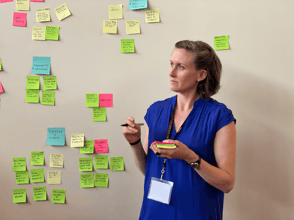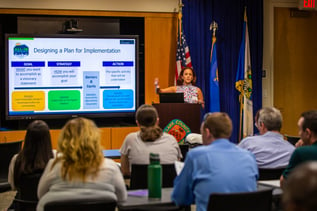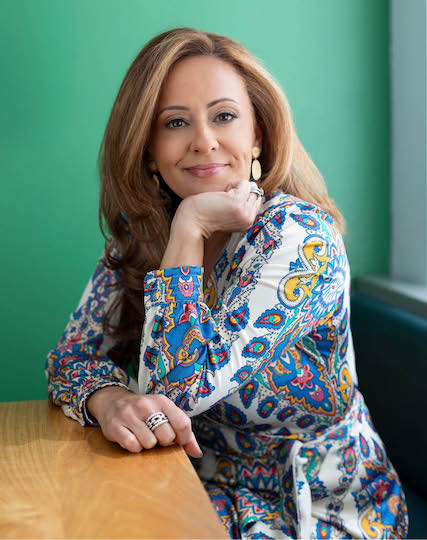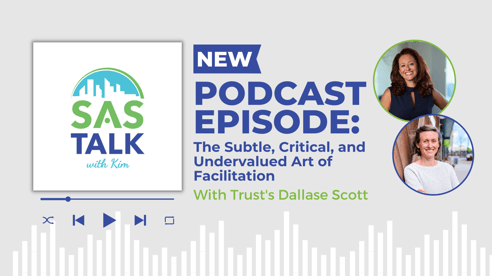To kick off the new year, we’ve reignited the KLA Sustainability Action Series podcast with rock star guest Dallase Scott to discuss why facilitation is such an undervalued skill and how to run more effective and inclusive meetings.
Dallase is the founder of Trust, a change motivator and incubator for mission-driven organizations. A longtime friend and colleague, Dallase is an expert in facilitation, organizational design, and change management. Her expertise lies in the intersection of strategic design, psychology, and sustainability consulting, making her a unique and sought-after figure in our industry.
Basically- if you’re going to take pointers on facilitation from anyone, Dallase is the best choice in the biz. And if you’re in local government, you’re going to be facilitating meetings – from smaller stakeholder sessions to big community events.
KLA has led the development of dozens of climate action plans in recent years from Clark County, Nevada’s All-In plan to Thrive Indianapolis, so we’ve got quite a bit of meeting facilitation under our belt. But we’re invested in improving those skills among our team, and so I brought in Dallase to do a training session at our retreat last fall. And we just couldn’t keep all her juicy intel to ourselves.
Here are some Dos and Don’ts from our conversation:
DO: Deepen your understanding of individual meeting behaviors.
Everyone shows up to meetings differently. You might have a general sense of someone’s personality - however, the way people show up in meetings can have a lot to do with their environment - how the meeting is managed, time of day, make-up of participants. Dallase recommends getting curious about why certain, sometimes challenging, behaviors are happening in your meetings. Try to understand and recognize the different types of common behaviors- overtalking, under sharing, tunnel vision, etc. -and think about how your meeting design might be creating these behaviors. With that curiosity you can adapt your process to be more inclusive of the people showing up with their learned behaviors.
 Overtalker? Overtalkers are usually comfortable thinking out loud – which helps them get to their ideas but dominates the conversation. Give them space to write down their ideas first – then be deliberate in asking for one concise idea.
Overtalker? Overtalkers are usually comfortable thinking out loud – which helps them get to their ideas but dominates the conversation. Give them space to write down their ideas first – then be deliberate in asking for one concise idea.
Undersharer? Undersharers might have many reasons why they don’t jump into conversations. Social anxiety. Internal processor. English as a second language. Try deliberately making space for them to speak or participate in a way that’s comfortable for them. Small group discussions. Worksheets. Chat functions. As a facilitator, you’re juggling not only the goals of the meeting, but also reading the room and noticing the divergence of behaviors and interactions. The more you can understand them, the better you’ll be able to adapt your process for effective results.
DO: Build a foundation for your process- but be ready to pivot.
Have you ever seen a facilitator flow through a meeting effortlessly? Dodging curveballs, redirecting problems, and just generally killing it? Dallase explains that this level of facilitation skill can only be achieved with a solid foundation. Through trial and error, you should build out a facilitation process that you can rely on. A strong foundation gives you the confidence to steer the ship in a skillful way.
Meetings processes are built on that foundation. So, if something isn’t working, you feel confident to pivot – because you have this foundation as an anchor to go back to and adjust your approach without losing sight of the big picture. Goal over tactics. Two marks of a good facilitator are the ability to respond to the room and adapt and having the confidence to improvise as needed.
DO: Be prepared.
 That might seem a little Captain Obvious, but everyone has been in – or, admit it, led – a meeting where you slap together the agenda almost as an afterthought. But a good meeting requires intentional and robust preparation, starting with your desired goals from the meeting. Not the topic but what you want to achieve. You craft an internal-agenda, a tool just for the facilitator, that best positions you to meet those goals, and you scope out any advance work that needs to happen and what meeting management tools you’ll need to prepare.
That might seem a little Captain Obvious, but everyone has been in – or, admit it, led – a meeting where you slap together the agenda almost as an afterthought. But a good meeting requires intentional and robust preparation, starting with your desired goals from the meeting. Not the topic but what you want to achieve. You craft an internal-agenda, a tool just for the facilitator, that best positions you to meet those goals, and you scope out any advance work that needs to happen and what meeting management tools you’ll need to prepare.
Pro tip: For interactive meetings (vs. Presentations), think back to elementary school and channel your 4th or 5th grade teacher. The same types of activities, worksheets, visual cues and prompts that they used to help us learn history and science will work for your community meeting, too. Dallase leads events for communities up to C-Suite strategy sessions and board meetings. There is no group who has not benefited from and appreciated the structure and creativity that came from these interactive sessions.
DON’T: Over-explain your process.
A key part of establishing trust between a facilitator and participant is transparency. Be clear about your process and be prepared to share your rationale for choosing one activity over another, why you value this form of discussion or not, and what results you expect to reap from your method. But don’t overdo it.
We want people to focus on the content of the meeting – to work collectively to solve a problem or map out a strategy together. If a facilitator gets too in the weeds about process, the brain power of the group shifts from content to process and that is wasted time.
 A quick food analogy. A professional baker is skilled at making excellent cookies – and part of that skill is getting a sense of their patrons’ flavor preference and asking about allergies. Then they take care of the rest. We would all be disappointed if the baker, when sharing their ingredient list or process, let their customers in the back of the kitchen to adapt the recipe on the fly. If someone is unsure about your process – give a brief overview of your rationale, let them know they can provide feedback at the end of the meeting too or talk through an idea at a break. But don’t let your meeting get hijacked wasting the full groups’ precious time.
A quick food analogy. A professional baker is skilled at making excellent cookies – and part of that skill is getting a sense of their patrons’ flavor preference and asking about allergies. Then they take care of the rest. We would all be disappointed if the baker, when sharing their ingredient list or process, let their customers in the back of the kitchen to adapt the recipe on the fly. If someone is unsure about your process – give a brief overview of your rationale, let them know they can provide feedback at the end of the meeting too or talk through an idea at a break. But don’t let your meeting get hijacked wasting the full groups’ precious time.
Be transparent and helpful, but don’t get into group process development. You’re the professional baker - Just give them the cookie.
No one is the perfect facilitator. Keep growing.
Dallase reminds us that even if you follow all the best advice, you should never become complacent. Always challenge yourself to improve your facilitation process; evaluate your method often, and always ask for feedback. Look for Strengths: what about today’s meeting worked for the group? and Improvables: what could be adapted or changed to have a better meeting in the future.
With that mindset, those cookies will only get better over time.
Want more powerful insight into the world of facilitation and organizational change? Check out Dallase’s new Growing Trust Series, where you can take part in digital workshops, broken up into bite-sized sections, and enhance your toolkit with Dallase’s expert guidance.





